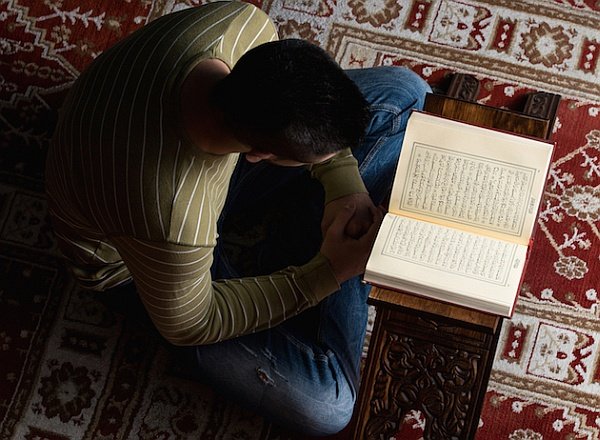The Qur’an is not a storybook relating stories from the past, nor is it only a book of wisdom. It is a book of guidance.
Muslims believe also that if anyone wants to understand a given issue, the Qur’an should then be consulted. Amazingly, one of my mentors used to read the whole Qur’an for at least once immediately before he starts to write anything on the issue he is studying to see what the Qur’an has to say about it.
Using the same technique in a non-literal way, it is found out that there are four ayahs in the Qur’an that present an extensive description of the believers. These ayahs use what can be called “the Restriction Style” ( uslub al-Hasr or al-Qasr) which is uniquely used in the Qur’an for the purposes of stressing certain issues and emphasizing certain pieces of information as surely is known to those who are learned about the inimitable style of the Qur’an.
Apparently, there are numerous ayahs in the Qur’an which speak in one way or another about the believers. However, what is unique about these four ayahs is their use of the Restriction Style. This style in Arabic – as well as in other languages – is very effective in showing the importance of something and the significance meant to be attributed thereto.
Let us take as an example the hadith in which the Prophet (peace and blessings be upon him) is reported to have said, “I was sent (by Allah) to only perfect the sublime morals.” (Ahmad’s Musnad) As if the Prophet (peace and blessings be upon him) summed up his entire divine mission in this matter through using the Restriction Style in the Arabic source of the hadith.[1]Accordingly, though there are many ayahs dealing with the description of the believers in the Qur’an, let us focus here on only those in which the Restriction Style is used. Theseayahs can be put in the following order which may differ from their order according to the time of revelation.[2] They are Al-Anfal 8:2, Al-Hujurat 49:10, 15 and An-Nur 24:62.
Actions of heart and organs
Allah Almighty says what may mean,
{For only those are true believers who, when Allah is mentioned, their hearts tremble; and when His verses are recited to them, it increases them in faith; and upon their Lord alone do they rely.} (Al-Anfal 8:2)
This ayah describes the quality of true believers who when Allah is mentioned, they feel a fear in their hearts, and thus implement His orders and abstain from His prohibitions. Allah Almighty says in another ayah what may mean,
{Moreover, these are the ones who when they commit any act of obscenity, or wrong themselves with sin, they remember Allah, [to whom they are accountable,] and so seek forgiveness for their sins. For who is it that forgives sins but Allah? Nor do they persist in whatever wrong they have done when they know it is wrong.} (Aal `Imran 3:135)
It is worth noting here that Imam Al-Bukhari and other Muslim scholars relied on this ayah(Al-Anfal 8:2) and those similar, as evidence that faith increases and varies in strength from heart to heart. This is also the view of the majority of the reliable and distinguished scholars of Islam.
The ayah also explains that the true believers hope in none except Allah as they direct their dedication to Him alone, seek refuge with Him alone, and invoke Him alone for their various needs and even for the fulfillment of their dreams.
Their faith tells them that whatever He wills, occurs and that whatever He does not will never occurs. They deeply believe in the fact that it is Allah alone who has the decision in His whole Kingdom with no associates or partners whatsoever. To quote Sa`id ibn Jubair as cited in Tafsir Ibn Kathir, “Tawakkul [faithful reliance on Allah] is the essence of faith.”Amazingly, the following ayah (Al-Anfal 8:3) describes the actions of the believers after their faith has been mentioned. The acts mentioned here include all types of righteous acts such as performing the salah and spending in the cause of Allah. Spending from what Allah has granted includes giving the obligatory zakah as well as the recommended voluntary charity.
Then, the following Qur’anic expression emphasizes and concludes this description of the believers as saying what may mean, {It is these who are, in truth, the believers.} (Al-Anfal 8:4), meaning that those who have these qualities are the believers with true faith.
Religious brotherhood
The second ayah that presents another aspect of the description of the true believers in Allah reads what may mean,
{The believers are but a brotherhood. So make reconciliation between your brothers, and have [piety] of Allah that you may receive mercy.} (Al-Hujurat 49:10)
Following showing the faith that must be obtained by the believers as well as the righteous actions they should be observing and sincerely performing, the Qur’an states that all Muslims are regarded by Allah as nothing but brothers and sisters under the umbrella of monotheism.
It is reported by Anas that the Messenger of Allah said, ‘Help your brother, whether he is an oppressor or he is an oppressed one.’ People asked, ‘O Allah’s Apostle! It is all right to help him if he is oppressed, but how should we help him if he is an oppressor?’ The Prophet said, ‘By preventing him from oppressing others.’ (Al-Bukhari)
The above ayah stresses the fact that all Muslims are but brothers in Islam as is said earlier. One can find many hadiths attesting to this very fact; foremost among which are the following:
Narrated `Abdullah bin `Umar: Allah’s Apostle said,
“A Muslim is a brother of another Muslim, so he should not oppress him, nor should he hand him over to an oppressor. Whoever fulfilled the needs of his brother, Allah will fulfill his needs; whoever brought his (Muslim) brother out of a discomfort, Allah, in return, will bring him out of one of the discomforts of the Day of Resurrection, and whoever screened a Muslim, Allah will screen him on the Day of Resurrection.” (Al-Bukhari)
Umm Ad-Darda’ reported: My husband reported that he heard Allah’s Messenger (peace and blessings be upon him) as saying,
Abu Ad-Darda’ (May Allah be pleased with him) narrated that the Prophet said:
The supplication of a Muslim for his (Muslim) brother in his absence will be answered. An angel is appointed at the head of the (supplicating) person; so every time he makes a supplication for his brother’s good, the angel says: ‘Ameen! May it be for you, too’. (Muslim)
In the hadith narrated by Abu Hurairah, the Messenger of Allah said what may mean, “…Allah helps a servant so long as the servant helps his brother.” (Muslim)
There are many hadiths with this meaning, such as the following:
Narrated An-Nu`man bin Bashir: Allah’s Apostle said,
“You see the believers as regards their being merciful among themselves and showing love among themselves and being kind, resembling one body, so that, if any part of the body is not well then the whole body shares the sleeplessness (insomnia) and fever with it.” (Al-Bukhari)
Narrated Abu Musa: The Prophet said, “A believer to another believer is like a building whose different parts enforce each other.” The Prophet then clasped his hands with the fingers interlaced (while saying that). (Al-Bukhari)
In Allah’s saying, “…and have [piety] of Allah that you may receive mercy,” it is clear that Allah Almighty commends Muslims to have piety in all of their affairs and He promises that mercy will be granted to those who fear and obey Him most.
Therefore, brotherhood can be seen as a positive and constructive relationship among all members of the Muslim Ummah under the banner of Islam. A banner that covers all those who obey Allah’s orders and execute what is demanded from them as perfectly as required while having piety and complete submission to the Will of Allah.
Leadership and obedience
The third ayah we are concerned with here is what follows and which may mean,
{Only those are believers, who believe in Allah and His Messenger: when they are with him on a matter requiring collective action, they do not depart until they have asked for his leave; those who ask for thy leave are those who believe in Allah and His Messenger; so when they ask for thy leave, for some business of theirs, give leave to those of them whom thou wilt, and ask Allah for their forgiveness: for Allah is Oft-Forgiving, Most Merciful}. (An-Nur 24:62)
Scholars of Tafsir (i.e. Interpretation of the Qur’an) see this as a matter of etiquette to which Allah has guided His believing servants. As Allah orders the believers just as He commanded them to seek permission when entering, He also commanded them to seek permission when leaving, especially when they are doing something together with the Messenger (peace and blessings be upon him) such as the Friday, `Eid, or congregational prayers, or a meeting for the purpose of consultation and so on.
Allah commanded them not to leave him in these situations until they had asked his permission. If they did this, then they were of the true believers. Then Allah commanded His Messenger to give permission when someone asked for it, if he wanted to. Abu Hurairah narrated that the Messenger of Allah said:
“When any of you joins a gathering, let him say Salam, and when he wants to leave, let him say Salam. The former is not more important than the latter.” (Abu Dawud)
However, I think there is more than this in the ayah; though the issue of educating the believers about the etiquette of dealing with the Prophet (peace and blessings be upon him) is crystal clear in more than one place in the Qur’an to preserve his lofty status as the Messenger of Allah. But, here I think that the Qur’an indicates it is obligatory for the true believers to realize that they must obey their leader, the Prophet (peace and blessings be upon him), and accept all his decisions in all of their affairs be it private or common.
True believers should realize that they constitute a whole body with a single leadership which should be obeyed all the time. They should realize that if the Prophet (peace and blessings be upon him) gives them permission to leave or refuses to do so, this is for their own good and the good of the whole Muslim Ummah.
Striving against ordeals
The fourth and, thus, final ayah in which we are concerned here reads what may mean,
{Only those are Believers who have believed in Allah and His Messenger, and have never since doubted, but have striven with their belongings and their persons in the Cause of Allah: Such are the sincere ones}. (Al-Hujurat 49:15)
The Muslim Ummah will never be left alone without being exposed to trials, ordeals and afflictions at the hands of the people of falsehood who are always hostile to Allah, His Messenger and the true Muslims. Then, the stand of Muslims must be decided whether to be patient, not to have any doubt, and to strive for the cause of Allah and His faith, or vice versa!
Therefore, those who have perfect faith are those who believe in Allah and His Messenger (peace and blessings be upon him); they do not have any doubts and their faith is never shaken. Rather, their faith remains on conviction.
In addition, it is obligatory on them that they gladly give away their life and the most precious of their wealth and property in obedience to Allah as a means of seeking His Pleasure in this present life and the Hereafter.
Finally, four ayahs in the Qur’an present a complete description of the believers who have true faith in Allah and His Messenger (peace and blessings be upon him) and who constitute the whole Muslim Ummah that is loyal to Allah and who can enjoin that which is good and forbid that which is evil. They can be summed up as follows:
– A true believer must have sincere faith in Allah and should be performing all commended righteous acts (Al-Anfal 8:2);
– All true believes are but brothers and therefore should do what they have to do to keep this sense of brotherhood intact (Al-Hujurat 49:10);
– All believers constitute the Muslim Ummah with a single leadership that should be respected and obeyed (An-Nur 24:62);
– As it is inevitable that the true believers of Allah are always fought against and defied, they should have faith, patience, certainty of Allah’s victory and they should strive with all they have be it their life or dear belongings (Al-Hujurat 49:15).
Sources:
- Al-Mubarakpuri, Safiur-Rahman (2000). Tafsir Ibn Kathir: Abridged. Dar-u-ssalam Publications, Riyadh.
- Hammad, Ahmad Zaki. The Gracious Qur’an: A Modern-Phrased Interpretation in English. Arabic-English Parallel Edition. 2009. Lucent Interpretations, LLC. USA.
- Imam Ahmed’s Musnad.
- Khan, M. and Hilali. Sahih Al-Bukhari Translation. Electronic version.
- Pickthall, M. M. Meanings of the Holy Quran. Electronic version, 1.04.
- Siddiqui, Abdul Hamid. Translation of Sahih Muslim. Version 1.02.
- Sunan of Abu Dawud.



